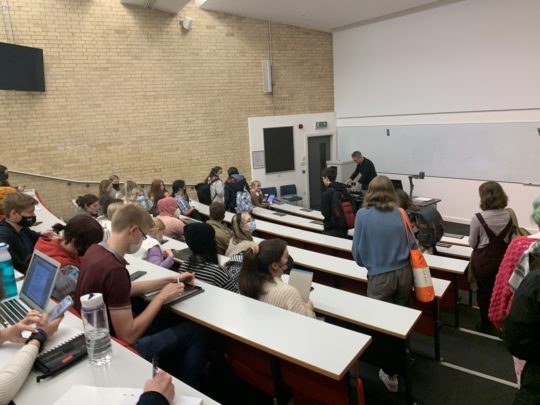
Lancaster anti-strike campaign receives backlash online
The manifesto claimed that strikes could be ‘potentially fatal’ to students
The Lancaster campaign to vote NO in the University and College Union’s Strike Referendum has received backlash online following the release of its manifesto.
The referendum, which takes place between Wednesday 10th and Friday 12th of November, will decide whether Lancaster University Students’ Union supports UCU industrial action this year.
Campaigns to vote both NO and YES were established and manifestos were released online, but negative comments began to circulate on Facebook and Twitter after some users picked up on specific wording in the NO manifesto, which reads:
“We believe that if these strikes were to go ahead, they could be potentially fatal for students. The strikes in 2019/20 were detrimental to student mental health.”
In response to the manifesto, NUS President, Larissa Kennedy, issued a statement that claimed: “I can’t fathom how someone can blame the overworked, underpaid people who give so selflessly to make these spaces more survivable for us.”
The manifesto continued to garner attention online, with LUSU representatives calling it “outrageous and inflammatory”.

Twitter via @Larissa_Ken and @h0pexha

Twitter via @Larissa_Ken
‘Strikes are happening whether we like it or not’
Students Against Disruption, the Instagram account that issued the manifesto, said: “The [claims that they blame the suicides on strikes] on Twitter are baseless. All of the mess was caused by maliciously decontextualised quotes from our manifesto.
“As is written in the manifesto, this is a sensitive topic for everyone involved. We wrote our manifesto in good faith. If anyone has any questions, please feel free to reach out.”
“This referendum is on the subject of whether an organisation that is meant to fight for the rights and welfare of students should continue to support disruption to our lives or try to help us during major periods of disruption. Strikes are happening whether we like it or not, this referendum result will dictate how LUSU operate during the strike period.
“We believe that LUSU should not be actively supporting continued disruption to our degrees.”

‘No one has a monopoly on caring about student mental health’
The Tab also spoke to LUSU President, Oliver Robinson, who said: “No one has a monopoly on caring about student mental health. The SU has lobbied hard over the last year to get additional resources committed to University counselling services with great success, getting an additional £120,000 a year for an out of hours service off the back of the Rent Strike this year (which the UCU supported). I’m also aware that the pandemic has had ruinous effects on our staff’s mental health, and their Union continues to fight for them too.
“The strikes are not something that anyone wants, but a last resort. I think it’s outrageous and inflammatory to use language like this and people are rightly upset. Our staff work incredibly hard to make this university the great place it is, and I think it’s important that we show them the same support they continue to show us.
“I hope that students will vote to stand in solidarity with our staff at the end of this week.”

‘These issues fundamentally impact both groups’
UCU Vice-president and Equality officer, Dr Julie Hearn said: “We are saddened by an attempt to divide staff and students on the issues of mental health and wellbeing, even though these issues fundamentally impact both groups whom we believe should be standing together in this dispute and confronting University management as a united front.
“We also believe that decollectivising this issue plays into the hands of a university management that has repeatedly shown disregard for the well-being of students, in a particularly difficult time for student mental health. UCU members have worked tirelessly, at huge cost to their own health and that of their families, to support students.
“Blaming unionised teaching staff and postgraduate students for standing up against continuing poor working conditions, including excessive workloads leading to burn-out, targets the symptom not the cause.”

Lancaster University was contacted for comment.
Related articles recommended by this writer:
Lancaster council candidates campaign at Politics Society event
Meet the candidates for Lancaster City’s Council election
Lancaster LGBTQ+ Forum to boycott Generation Nightclub









































